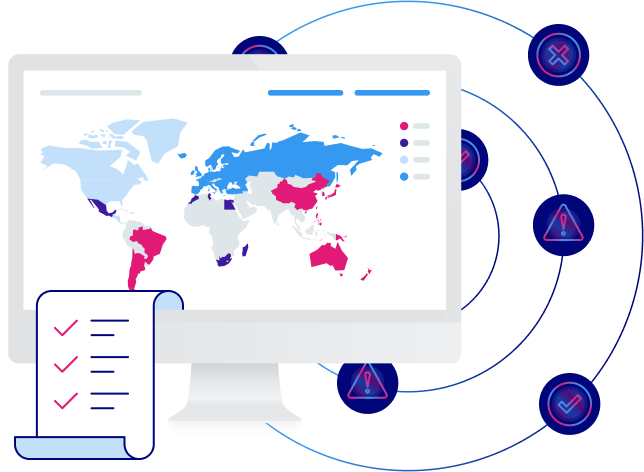-
Solutions
- AI Governance
- Responsible AI
- Geo-Specific Cookie Banner
- Consumer Preference Management
- Data Subject Request Automation
- Data Mapping and Vendor Risk Management
- Migrate
- Privacy, Vendor, and Risk Assessments
- Privacy Program Management
- Regulatory Guidance
- Privacy Program Consulting
- Certifications and Verifications
- International Data Transfers
Forrester TEI ROI of Privacy ReportTrustArc commissioned a Forrester study to analyze the potential benefits of using our platform and the Forrester team found ROI linked to efficiency, compliance, and decreased cost in data breaches.
Read the report -
Products Products Privacy Studio Overview
Automate consent and data subject rights compliance. Design seamless privacy experiences to enhance customer trust across your digital landscape.
- Cookie Consent Manager Effortlessly manage cookie consent for global compliance, ensuring a secure, personalized browsing experience.
- Consent & Preference Manager Easily manage and orchestrate customer consent and preferences across brands and channels.
- Individual Rights Manager Automate and streamline DSR workflows to ensure compliance and show your commitment to customer rights.
- Trust Center Centralize policies, disclosures, and trust-building information in a customizable no-code hub that speeds up deals.
Products Governance Suite OverviewStay ahead of privacy and compliance regulations. Simplify data privacy management and ensure data governance with cutting-edge apps.
- PrivacyCentral Centralize privacy tasks, automate your program, and seamlessly align with laws and regulations.
- Data Mapping & Risk Manager Gain full visibility and control of your data and accurately identify and mitigate risks.
- Assessment Manager Automate and score privacy assessments like PIAs and AI Risk, streamlining your compliance workflow.
- Nymity Research Get instant access to the latest in privacy regulations, legal summaries, and operational templates.
Products Assurance Services OverviewGain trust and credibility with leading privacy certifications from unbiased experts, backed by technology for unmatched privacy compliance assurance.
- Dispute Resolution
- TRUSTe Global CBPR and PRP Certification
- Data Privacy Framework Verification
- TRUSTe APEC CBPR and PRP Certification
- TRUSTe Responsible AI Certification
- TRUSTe Enterprise Privacy Certification
- CCPA/CPRA Validation
- GDPR Validation
- TRUSTe Data Collection Certification
- TRUSTe EDAA Privacy Certification
- Digital Advertising Alliance Validation
-
Regulations
- EU General Data Protection Regulation (GDPR)
- California Consumer Privacy Act (CCPA)
- Virginia Consumer Data Protection Act (CDPA)
- NIST AI Framework
- ISO/IEC 27001
EU Artificial Intelligence Act (EU AI Act)EU's regulation on the use of AI and the world's first comprehensive AI law.
Learn moreIndia Digital Personal Data Protection ActComprehensive data protection law governing the processing of personal data of Indian citizens.
Learn more - Resources
- Arc ✦
- Contact us
General Data Protection Regulation (GDPR)
The world’s most comprehensive data privacy and protection law requires organizations to adhere to 7 common principles, provide the ability to exercise the 8 individual rights and demonstrate an on-going commitment to data privacy.
Does the EU GDPR apply to my organization?
The reach of the EU GDPR extends quite broadly and extends outside the EU depending on certain factors. Answering these three questions below can help determine whether your organization is impacted by this regulation and EU GDPR and could incur GPDR fines.
Answering “yes” to any of the three questions below impacts your organization.
EU GDPR Requirements for Compliance
7 principles
1. Lawfulness, fairness & transparency
Addresses why an organization needs to process personal data
2. Purpose limitation
Addresses what is the intended purpose for processing the personal data
3. Data minimization
Process only the required personal data to complete transaction (e.g., postal address required for eCommerce activities)
4. Accuracy
Ensure that the personal data is current and accurate
5. Storage limitation
Addresses how long this personnel data is retained
6. Security integrity & confidentiality
The storage and use of personal data must meet specific security and confidential standards and expectations related to the potential risk of exposure on the personal data
7. Accountability
Addresses the specific actions implemented and practice to ensure data privacy principles are upheld across the organization
8 individual rights
1. Right to be informed
Provide individuals with clear information about what an organization does with their personal data.
2. Right of access
Individuals may request a copy of the personal data held on them.
3. Right to rectification
Provide reasonable steps taken to either confirm that the personal data is correct or to rectify it where necessary
4. Right to erasure
When personal data is no longer needed for the intended purpose for collection and when consent is withdrawn for its use
5. Right to restrict processing
Restricts use of personal data only in ways which the individual approves.
6. Right to data portability
Enables individuals to obtain and reuse their personal data across different services.
7. Right to object
The individual’s right to stop or prevent the processing of their personal data at any time.
8. Rights related to automated decision making including profiling
The ability to know if automated (non-human involved) decisions are being made that may discriminate, be biased, or inaccurate in whatever is being processed

Essential guide to the GDPR
Years after its implementation, enforcement of the General Data Protection Regulation (GDPR) is in full swing and fines are commonly reaching into the millions and billions. To avoid suffering significant losses, small, medium, and large businesses need a plan for GDPR compliance, fast!
Using the Essential Guide to the GDPR, you can decipher over 200 pages of GDPR legal text into practical implementation steps that minimize risk, ensure compliance, build trust, and protect your brand.
Achieve GDPR compliance with TrustArc
-
What personal data is being “processed” by your organization? Data Mapping & Risk Manager records and documents personal data processes and general activities associated.
-
What are the risks associated with that personal data? With Risk Profile, AI reviews specific risk variables, scores and recommends necessary risk assessment (e.g., PIA, DPIA, etc.).
-
How does your organization facilitate the exercise of EU GDPR individual rights? Individual Rights Manager operationalizes individual rights and provides curation workflow.

GDPR FAQ
- Can an organization “process” (includes viewing and storage) EU personal data in the United States?
- Is EU employee personal data subject to EU GDPR? What about business to business personal data?
- Is the UK Data Protection Regulation the same as EU GDPR?
- Can an organization use “cookies and other trackers” with EU citizens or residents?
The information provided does not, and is not intended to, constitute legal advice. Instead, all information, content, and materials presented are for general informational purposes only.




